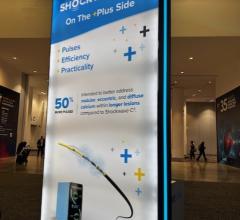
Image courtesy of Medtronic
October 22, 2015 — Medtronic plc released the first CoreValve transcatheter aortic valve replacement (TAVR) system outcomes data using CoreValve data from The Society of Thoracic Surgeons and American College of Cardiology (STS/ACC) Transcatheter Valve Therapy (TVT) Registry. The data show that everyday clinical experience from 6,160 CoreValve patients treated by a wide variety of heart team implanters replicates the excellent outcomes achieved in robust clinical trials. The primary outcomes of all-cause mortality and stroke in the STS/ACC TVT Registry were numerically similar to the findings in the CoreValve U.S. Pivotal Trial, which demonstrated statistical superiority to surgical aortic valve replacement in high-risk patients.
The CoreValve patients in the STS/ACC TVT Registry showed an exceptionally low rate of all-cause mortality (5.2 percent) and all stroke (2.6 percent) at 30 days, consistent with pivotal trial results (6.9 percent all-cause mortality and 5 percent all stroke). The STS/ACC TVT Registry data represents all patients entered into the registry who were implanted with the CoreValve System since U.S. Food and Drug Administration (FDA) approval in January 2014 through March 2015. The patients in the registry were similar to those enrolled in the pivotal trial with an average age 81.1 years (82.9 in the pivotal trial), average STS risk model score of 8.7 (9.2 in the pivotal trial) and similar comorbidity profiles including 83.7 percent of patients being New York Heart Association (NYHA) Class III/IV (89.4 percent in the pivotal trial).
“It is reassuring to see that the profound clinical results in the U.S. CoreValve Pivotal studies were replicated among patients at high or extreme surgical risk in a ‘real-world’ clinical setting,” said Jeffrey J. Popma, M.D., director of interventional cardiology at the Beth Israel Deaconess Medical Center, Boston, co-principal investigator of the U.S. CoreValve Pivotal Trial and presenter of the STS/ACC TVT Registry CoreValve data at the Transcatheter Cardiovascular Therapeutics (TCT) scientific meeting. “The favorable results from the CoreValve analyses are likely attributable to operator experience, thoughtful patient selection, and effective education and training based on the best practices learned in the U.S. Pivotal Studies, including the use of CT-based [computed tomography] sizing. We believe that these results indicate that the CoreValve self-expanding bioprosthesis is safe and effective in patients with severe aortic stenosis unsuitable for surgery across a wide spectrum of U.S. medical centers.”
Compared to the CoreValve U.S. Pivotal Trial, the STS/ACC TVT Registry CoreValve data analyses also demonstrated:
- CoreValve implantation was successful in 98 percent of cases (96.8 percent in the pivotal trial) with just 0.7 percent of cases requiring conversion to surgery (0.2 percent in the pivotal trial)
- With the CoreValve system’s low delivery profile, 89.3 percent of patients were able to be treated via transfemoral access (77.3 percent in the pivotal trial) with an extremely low rate of major vascular complications (1.1 percent compared to 7.5 percent in the pivotal trial)
- Only 1.5 percent of patients required valve-related readmission (5.9 percent in the pivotal trial)
CoreValve hemodynamic performance was excellent with a single-digit mean gradient (a measure of blood flow through the valve) of 7.7 ± 4.2 mm Hg at 30 days and 8.1 ± 3.9 mm at one year. As in the clinical trial setting, patients experienced dramatic improvements in quality of life (Kansas City Cardiomyopathy Questionnaire reduction from 40.9 to 68.7, the strongest improvements possible via the test), as well as significant reductions in symptoms (from 83.8 percent NYHA Class III/IV to 13.4 percent) at 30 days. Excellent results continued in 380 patients followed out to one year with all-cause mortality at 18.8 percent, while stroke remained low at 2.6 percent. There were no reports of valve thrombosis through one year.
The CoreValve System is approved by the FDA for patients at extreme risk and high risk for surgery.
For more information: www.medtronic.com


 October 31, 2025
October 31, 2025 









